McDonald’s stages a global heist for UK menus
McDonald’s turns social envy into brand buzz with a multi-phase global stunt
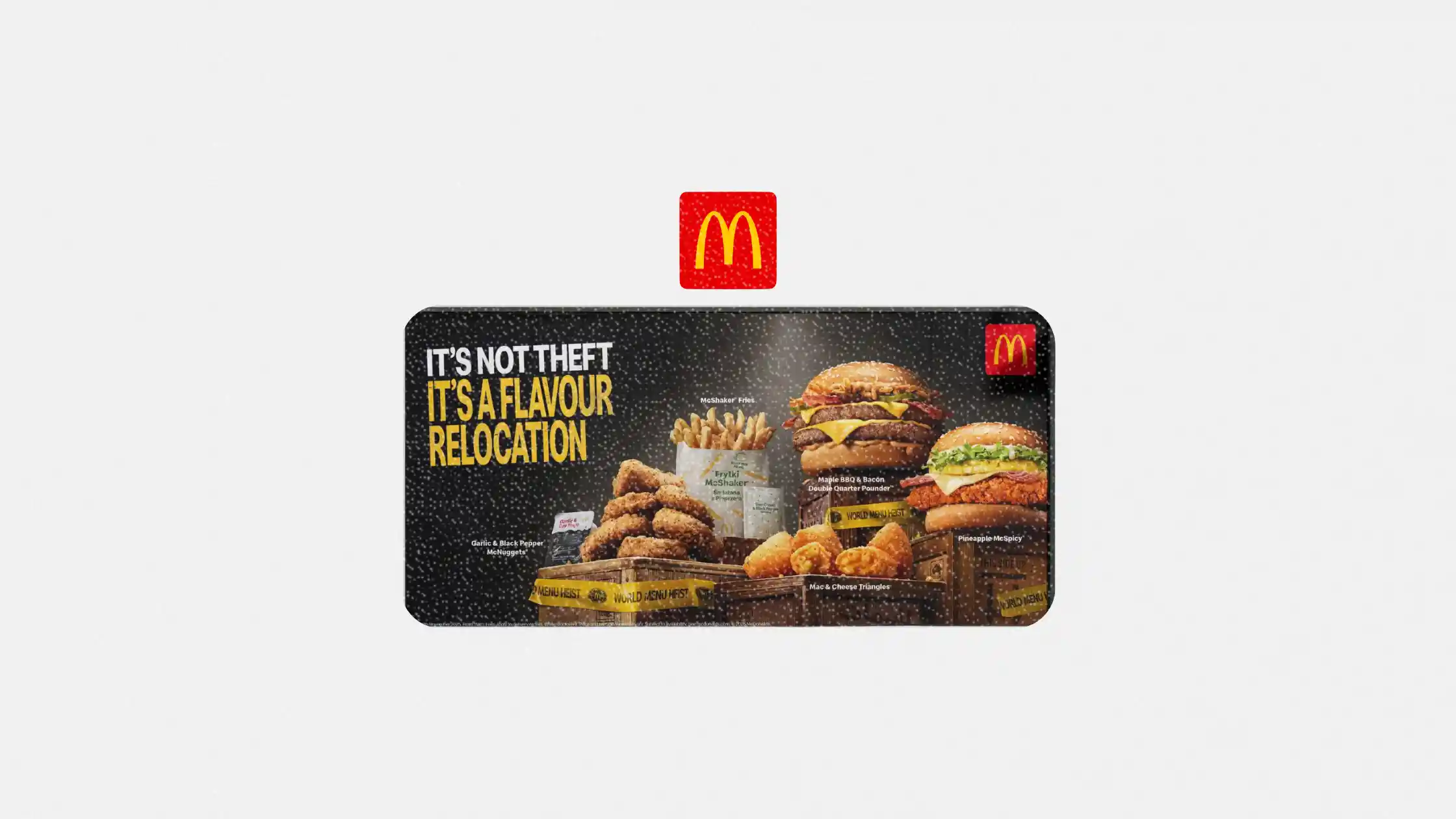
McDonald’s UK and creative agency Leo UK just staged an international “heist,” but not the kind that lands you in court. The fast food giant launched a full-scale integrated campaign called World menu heist, designed to introduce eight fan-favourite items from international McDonald’s menus into the UK for the first time.
Built around a high-concept three-act narrative (Plan, Execute, Getaway), the campaign taps into years of FOMO-driven chatter on social media, where UK fans lament not having access to viral global McDonald’s items. With the help of cinematic storytelling, stealthy influencer activations, and real-time digital touches, McDonald’s turned that envy into a marketing goldmine.
This article unpacks the campaign’s structure, creative execution, and what brand marketers can learn from it.
Short on time?
Here’s a table of contents for quick access:
- What’s behind the World menu heist
- How the campaign unfolded
- Why this campaign works for brand marketers
- Lessons for marketing teams
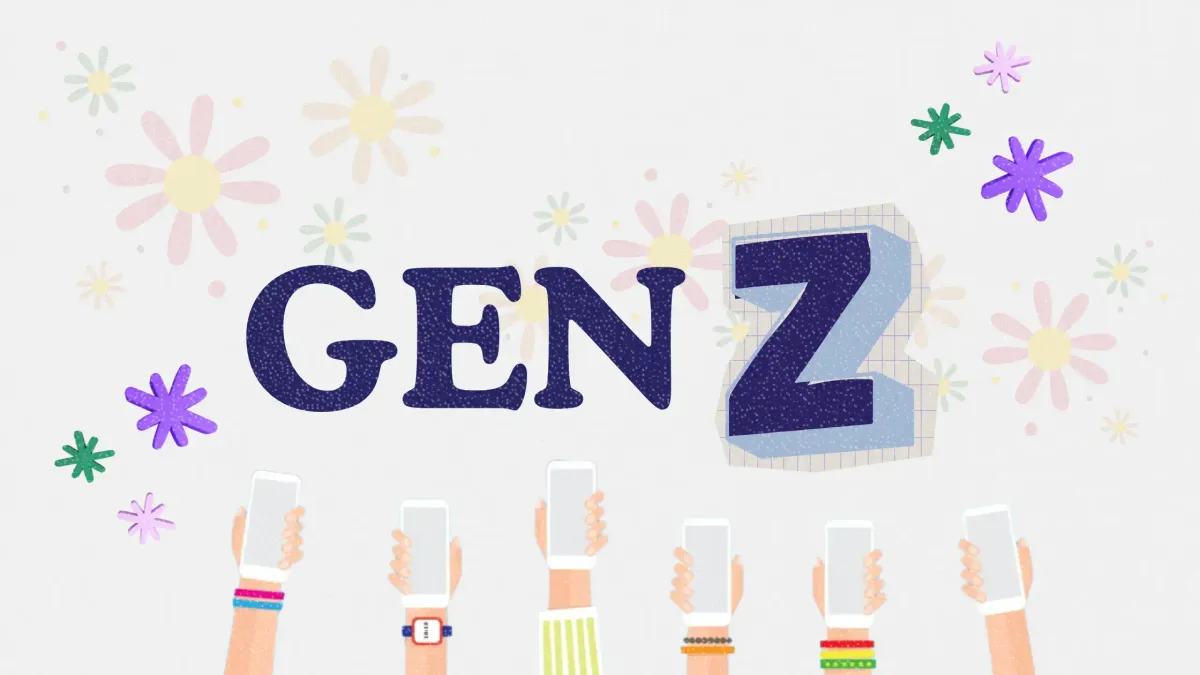
What's behind the World menu heist
For years, UK fans have pined for McDonald’s international-only menu items like Japan’s garlic and black pepper McNuggets, Malaysia’s salted caramel McFlurry, or the UAE’s mac and cheese triangles. Rather than quietly adding these to the menu, McDonald’s built a global-narrative campaign around their arrival.
Launched on 22 October and running through 25 November, the World menu heist turns the menu launch into a story of criminally good food smuggled into UK restaurants. Leo UK led creative, with media by OMD, PR and influencer work from Red Consultancy, CRM by TMW, and in-store POP from Linney.
The campaign is being deployed across TV, cinema, VOD, social media, radio, OOH, and CRM, making it one of McDonald’s most ambitious integrated efforts to date.
How the campaign unfolded
Phase 1: The Plan
Beginning 1 October, McDonald’s quietly built buzz through a bespoke Instagram “close friends” list, giving select fans early access to sneak peeks, taste invites, and narrative cues. This phase culminated in a tasting event on 18 October with over 1,000 attendees, including influencers and everyday fans.
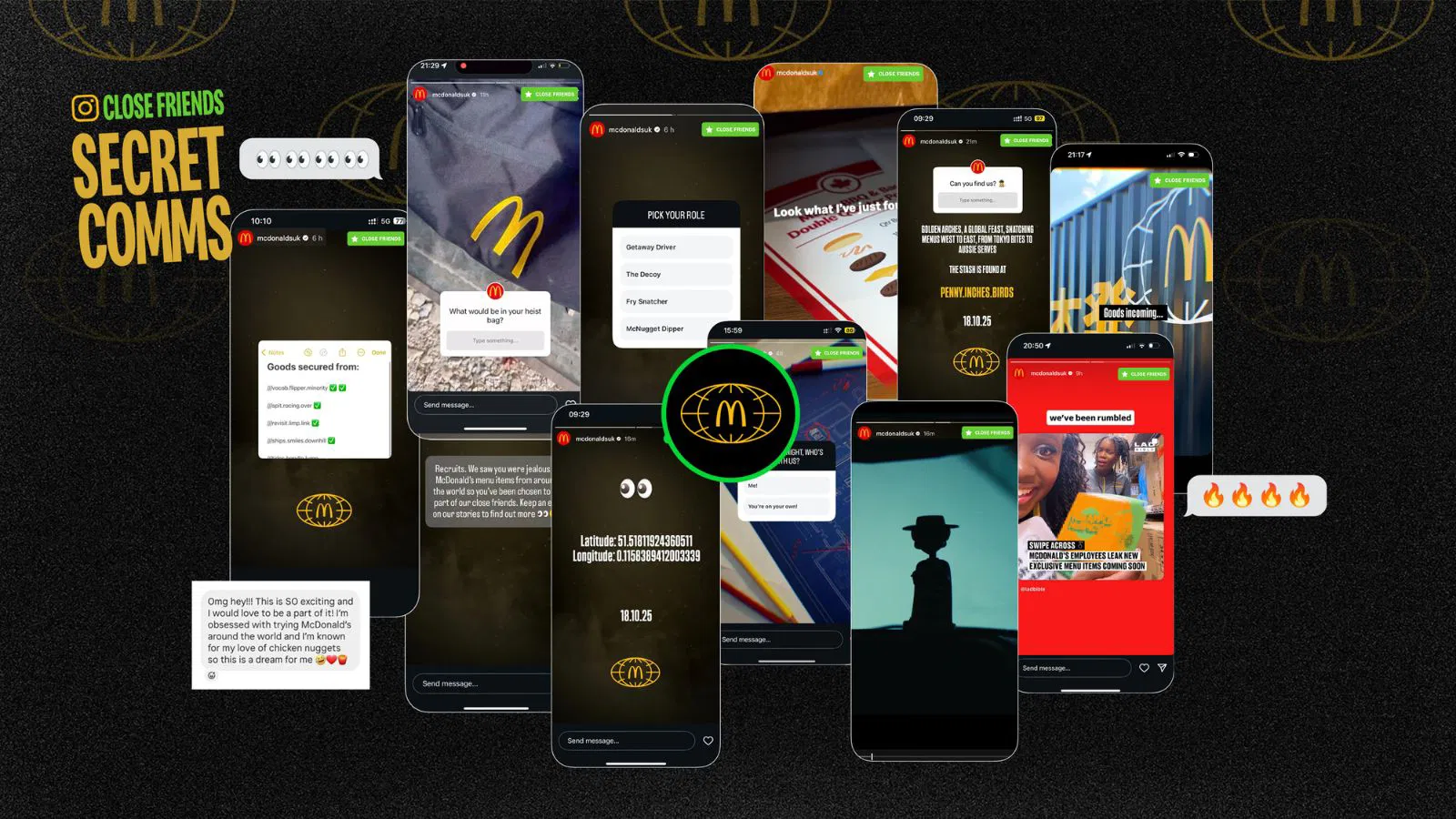
Phase 2: The Execute
The hero film dropped 22 October, playing like an Ocean’s Eleven-style action comedy with fast cuts, faux-criminal capers, and a smuggled McFlurry machine on a jet ski. Meanwhile, McDonald’s partnered with LADbible to seed faux “CCTV leak” videos teasing the drop. These clips triggered speculation across social media, building up momentum for the launch.
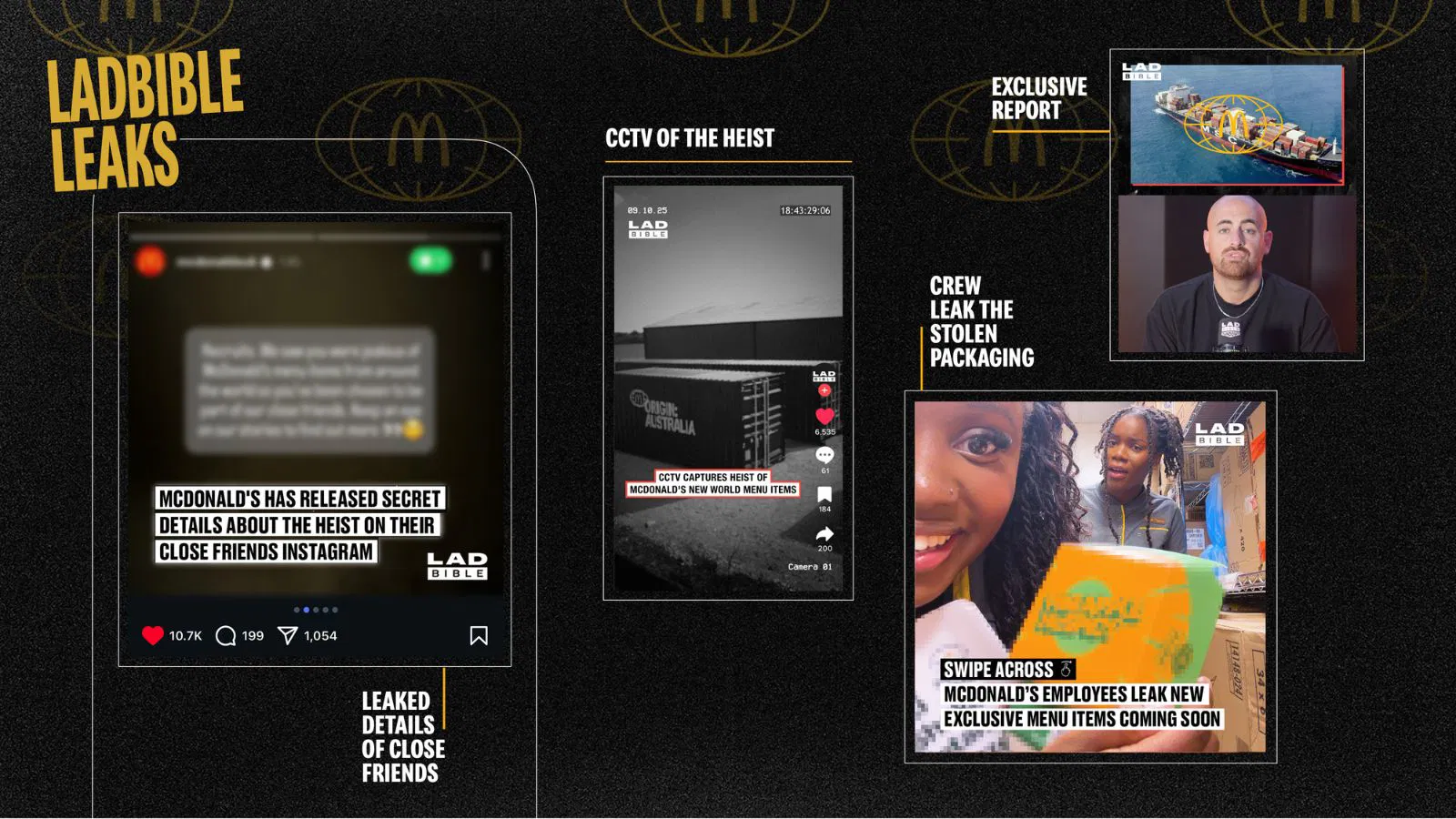
The execution phase includes cutdowns for digital and social, with influencer collaborations and behind-the-scenes content expanding the narrative across CRM, app alerts, and restaurant experiences. OOH ads leaned into the movie motif with “capture posters” of the global menu items, each with playful captions nodding to their origins.
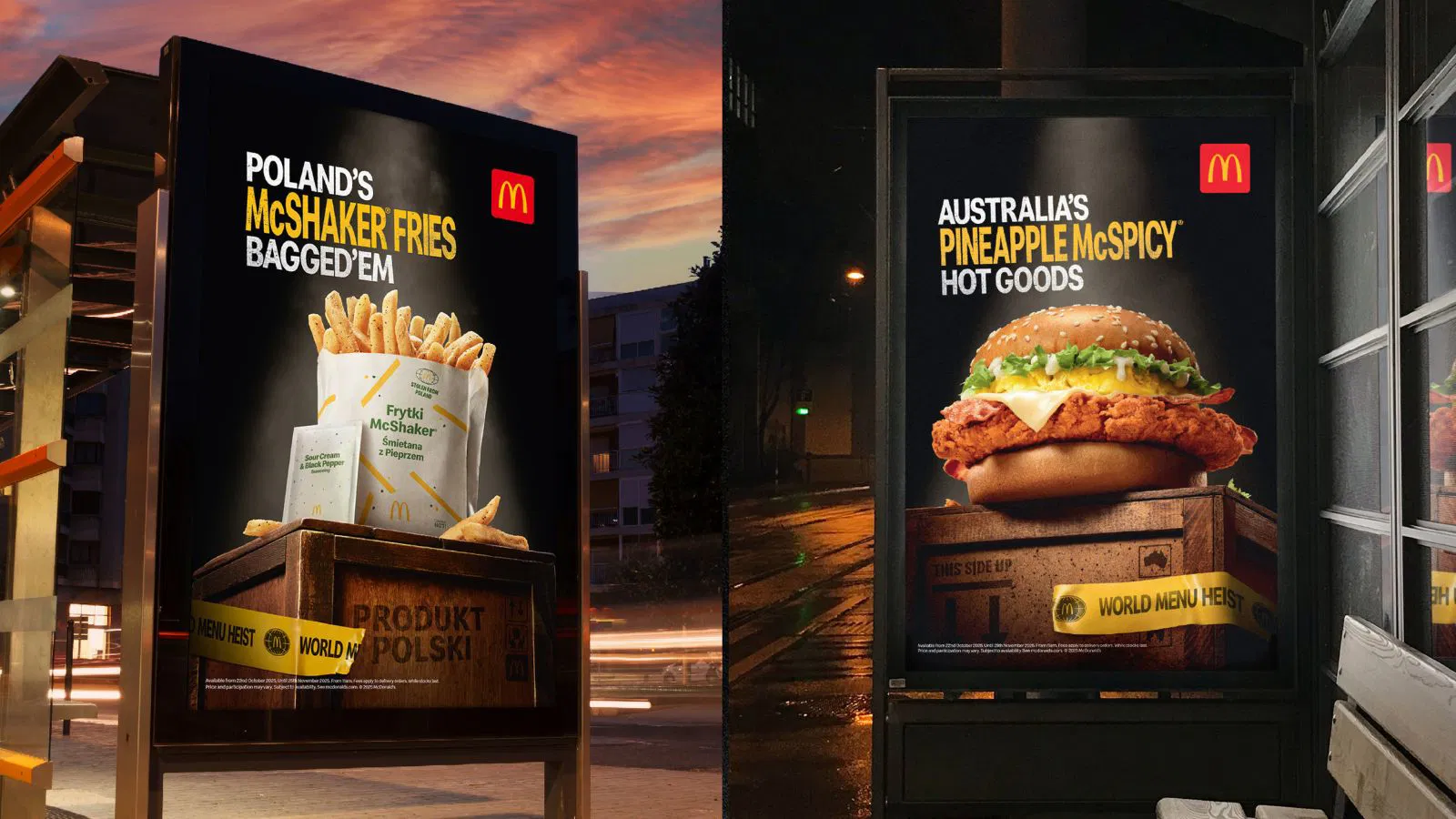
Phase 3: The Getaway
Running 17 to 25 November, this final phase leans into urgency. With the limited-time items set to disappear, digital OOH includes countdowns and warnings. App notifications and CRM messaging remind fans to grab them before they vanish from stores.
Why this campaign works for brand marketers
This isn’t just a menu drop. It’s cultural engagement with a long tail. Here's why this campaign hits the mark:
- It starts with real fan sentiment
McDonald’s didn’t manufacture interest. The campaign builds directly off years of social envy and online chatter about the global menu. By using user emotion as the jumping-off point, the brand ensured relevance and resonance.
- It treats the campaign like entertainment
Rather than treating ads as interruptions, McDonald’s and Leo UK created content that mimics popular entertainment. The hero film, for instance, could double as a Netflix trailer. That keeps audiences watching, not skipping.
- It builds in community access
By using Instagram’s “close friends” feature, McDonald’s turned early fans into insiders. This level of personalised engagement isn’t just tactical. It’s strategic brand relationship-building.
- It uses scarcity without gimmicks
The Getaway phase’s countdown isn’t artificial urgency. It’s based on a real-time offer window. That adds stakes without undermining credibility.
What marketers should learn from this
This campaign isn’t just flashy creative. It’s a blueprint for how to translate audience obsession into cross-platform momentum. Here’s how marketers can apply the same thinking:
1. Turn FOMO into fuel
Identify where your customers feel excluded, overlooked, or underserved. Then flip that emotion into a compelling story. Emotional insight drives creative power.
2. Create narrative arcs, not just touchpoints
The three-act structure (Plan, Execute, Getaway) creates anticipation and payoff. It’s not enough to go live with a campaign. Build a storyline that unfolds across phases and platforms.
3. Use your owned channels smarter
McDonald’s Instagram close friends strategy shows how even standard features can become exclusive brand-building tools when used creatively.
4. Integrated isn’t the same as omnichannel
The magic here lies not just in being everywhere. It's tying every channel back to a shared story and tone. Whether it’s a CRM email or an OOH board, every execution plays its role in the heist.
McDonald’s World menu heist isn’t just a fun campaign. It’s a case study in audience-first creative, cross-channel storytelling, and emotional insight. It takes a simple product launch and turns it into a cultural event. Marketers in any industry should take notes.
For brands looking to stand out in saturated markets, this campaign is a reminder: strategy, not scale, wins hearts and wallets.




